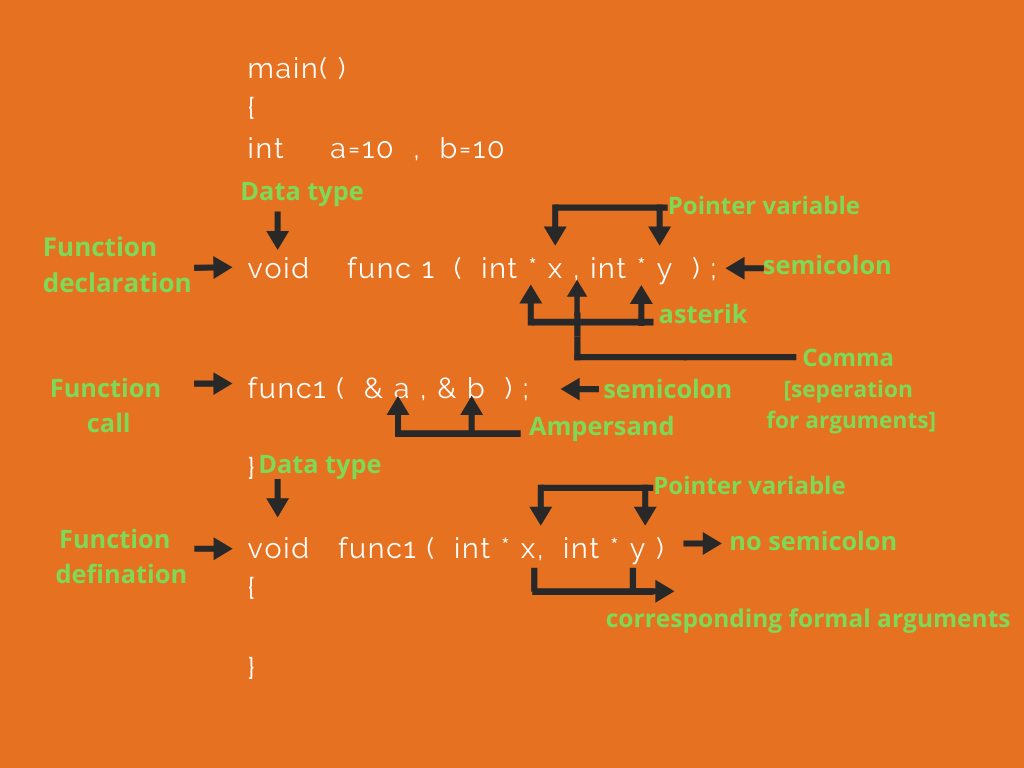function pointer as argument in C
Pointers are considered difficult to understand for beginners but pointers can be made to work if you fiddle with them long enough. So, let’s understand this step by step.
What are Pointers?
A pointer is a variable and this variable contains the address of another variable, i.e., it’s a variable which has the address of another variable as its value. The utilization of pointers is to access the memory and also, to govern the address (manipulation of address).
For eg, If a is a variable of type int having value \0 stored at address 3000 and address of a is assigned to some other variable b, then b is a pointer variable pointing to memory address stored in it. In simple words, b is a pointer variable containing the address of a (i.e., 3000).
Passing Addresses to Functions
An argument is the value that is passed to the function by the user who calls the function. There are two ways in which arguments are generally passed to functions and they are passed in one of the following ways:
by sending;
| a) the values of the arguments |
| b) the addresses of the arguments |
In the first method (a), the value of every actual argument within the calling function is copied into the resemblant formal argument of the function which is called.
In this article, we are more concerned about the second way, i.e., Sending the addresses of the arguments.
Function Pointer as argument in C
The method(b) suggests that Pointers can be passed to a function as arguments. When an address is passed to a function, then the parameters which receive the address should be pointers. In simple words, we are able to relay the reference of a function as a parameter by employing a function pointer. This method of passing parameters is called the Call by Reference method.
Here, an individual must recognize that if any modification is introduced by the function using pointers, then it’ll also mirror the modifications at the address of the passed variable. What this suggests is that any changes made are recognized in both the functions and therefore the calling routine.

In above figure,
func1() is a function in which arguments passed are addresses of a and b and no value is returned by this function therefore void data type is mentioned before the function.
In function definition, we have formal arguments as pointer variables that are local to the block in which they are defined.
In C, a function pointer is often created or declared as follows:
(type) (*pointerName) (parameter);
Here, type = variable type which is returned by the function
*pointerName = function pointer
parameter = list of arguments passed(to the function)
In the call by reference method, what actually happens is that the addresses of actual arguments within the calling function are copied into formal arguments of the called function.
What can we mean by this technical jargon?
This statement simply states that using the formal arguments within the called function is that we are able to make changes within the actual arguments of the calling function.
Let’s understand this using a C program,
main()
{
int x = 5;
int y = 10;
void swap (int*p, int *q);
swap (&x, &y);
printf(“\nx = %d”, x);
printf(“\ny = %d”, y);
}
void swap (int*p, int*q)
{
int s;
s = *p;
*p = *q;
*q = s;
}
Output
x = 10;
y = 5;
In the above code,
→ The address of two numbers is passed to a function swap() whose arguments are pointer type variables.
→ When values are passed, the values assigned to pointer (*p and *q) are changed. It means new values will be assigned to them.
→ This change in addresses is passed to the main() function where they are printed.
*Note: A function pointer can even point to a different function, or in other words that it can hold the address of another function.
Eg:
int sum (int x, int y); // function declaration
int (*x) (int, int); // declaration of a pointer to a function
x = sum; // assigning address of sum() to ‘x’ pointer